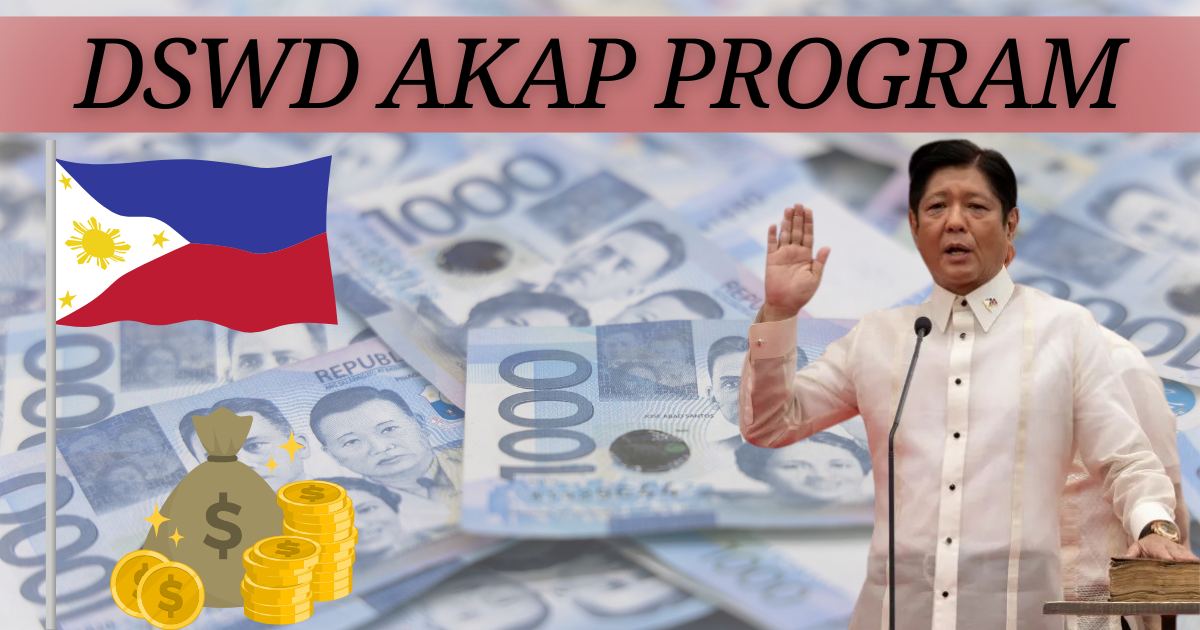DSWD AKAP Program 2025: Financial Assistance Announced for 5 Million Filipinos. The Department of Social Welfare and Development (DSWD) launched a financial assistance program in 2024 and it was a big success. About five million near-poor Filipinos benefited from the “Ayuda para sa Kapos ang Kita Program (AKAP) during the first year of launch, from January to December. This payment is provided to eligible citizens to help them cover necessary expenses. If you are interested in learning more about the DSWD AKAP program and the financial assistance that was provided to nearly 5 million Filipinos, please keep reading the article.
DSWD AKAP Program 2025
The agency’s spokesperson, Irene Dumlao, said on Thursday, “The first-year implementation of the Department of Social Welfare and Development’s (DSWD) Ayuda para sa Kapos ang Kita Program (AKAP) was very successful, having demonstrated a strong impact on many near-poor Filipinis.

Dumlao, also assistant secretary of the DSWD, said nearly 5 million near-poor Filipinos have benefited from the AKAP during its first year of implementation from January to December last year. “The AKAP has demonstrated strong impact with PHP 26.157 billion in funds, or 99.31 percent utilization rate, from the total PHP 26.7 billion budget allocation for 2024,” Dumlao said.
The AKAP funds were allocated across the country and almost all regions accomplished more than 99 percent in fund obligations, with Cagayan Valley (Region 2), Davao Region (Region 11), and Caraga (Region 13) posting 100 percent utilization.
The AKAP program provides cash assistance of PHP5,000 to eligible beneficiaries. The DSWD explained, “To qualify, families must have incomes below the poverty threshold and must not be receiving assistance from other government programs.”
AKAP was one of the items under the 2025 national budget criticized, as many observers believe it should be used for politics, especially with the country months away from the midterm elections. Former Finance Undersecretary Cielo Magno said lawmakers are merely using Akap for “political gain.” On this Gatchalian said that the DSWD will not be used by anybody for their political gains, not next year, not ever.” He further added, “Our social workers, and not politicians, determine the beneficiaries. DSWD social workers also process the Akap applications and determine how much the qualified beneficiaries will get.” The agency’s FOs actively coordinate and work with LGU officials in payout activities but only for logical support, he added.
Carpio said publication of such information would ensure that the beneficiary has the precise amount provided by the DSWD. He stated, “If it turns out that the only members of Congress recommended, then that would violate the prohibition that congressmen can only appropriate but cannot implement because the implementation belongs to the Executive Branch. That’s the PDAF case.”
Carpio added, “If maybe 25 to 30% of those who recommended are members of Congress, and the rest are local officials and civil society people, that will be okay. But if the overwhelming people who made the recommendations are from Congress, I think will be okay. But if the overwhelming people who made the recommendations are from Congress, I think… there’s something wrong there. So at least everybody will be assured that this is above board; let’s just publish.”
Beneficiaries may request Akap for cash, food, funeral, and medical assistance; these requests will be granted by the DSWD’s Crisis Intervention Units nationwide.
“There is no GAA line item that entitles any congressional district or LGU to have an allocation in any amount and lodged this with the DSWD that could benefit their constituents. References from legislators and local executives are entertained pursuant to existing DSWD guidelines,” Gatchalian said.
The menu of support under the AKAP comprises medical, funeral, food, and cash relief, which are offered directly via the DSWD’s Crisis Intervention Units/Sections (CIU/S) at both the Central and Field Offices (FOs) and through the Social Welfare and Development (SWAD) and Satellite Offices across the nation.
With the signing of the General Appropriations Act (GAA) for 2025, around 5 million minimum wage earners and Filipinos living on the poverty threshold are anticipated to benefit from the DSWD’s AKAP.
Gatchalian said, “There is no GAA entitleing any congressional district or LGU to an allocation via the DSWD to benefit their constituents.” He added, “Referrals from legislators and local executives are entertained under the existing DSWD guidelines.” The Department of Budget and Management has stated that Akap will be subject to “conditional implementation,” which entails the issuance of guidelines prior to the implementation of projects and programs.


